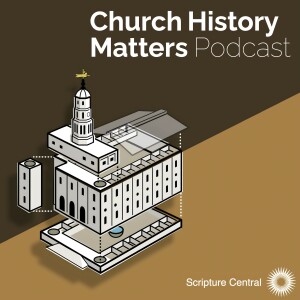Episodes

Tuesday Mar 04, 2025
Tuesday Mar 04, 2025
Welcome to Church History Matters Come Follow Me Edition where we are systematically diving into every section of the Doctrine and Covenants throughout the year 2025! In this episode Scott and guest host Anthony Sweat cover Doctrine and Covenants 20-22 while offering their insights into the context, content, controversies, and consequences of these important sections.

Wednesday Feb 26, 2025
Wednesday Feb 26, 2025
Welcome to Church History Matters Come Follow Me Edition where we are systematically diving into every section of the Doctrine and Covenants throughout the year 2025! In this episode Scott and Casey cover Doctrine and Covenants 19 while offering their insights into the context, content, controversies, and consequences of these important sections.

Tuesday Feb 18, 2025
Tuesday Feb 18, 2025
Welcome to Church History Matters Come Follow Me Edition where we are systematically diving into every section of the Doctrine and Covenants throughout the year 2025! In this episode Scott and Casey cover Doctrine and Covenants 18 while offering their insights into the context, content, controversies, and consequences of these important sections.

Thursday Feb 13, 2025
Thursday Feb 13, 2025
Welcome to Church History Matters Come Follow Me Edition where we are systematically diving into every section of the Doctrine and Covenants throughout the year 2025! In this episode Scott and Casey interview Daniel C. Petersen about the Book of Mormon Witnesses in this bonus "Voices of the Restoration" episode.

Tuesday Feb 11, 2025
Tuesday Feb 11, 2025
Welcome to Church History Matters Come Follow Me Edition where we are systematically diving into every section of the Doctrine and Covenants throughout the year 2025! In this episode Scott and Casey cover Doctrine and Covenants 12-17 while offering their insights into the context, content, controversies, and consequences of these important sections.

Tuesday Feb 04, 2025
Tuesday Feb 04, 2025
Welcome to Church History Matters Come Follow Me Edition where we are systematically diving into every section of the Doctrine and Covenants throughout the year 2025! In this episode Scott and Casey cover Doctrine and Covenants 10-11 while offering their insights into the context, content, controversies, and consequences of these important sections.

Saturday Feb 01, 2025
Saturday Feb 01, 2025
Welcome to Church History Matters Come Follow Me Edition where we are systematically diving into every section of the Doctrine and Covenants throughout the year 2025! In this episode Scott and Casey interview John W. Welch about the miraculous translation of the Book of Mormon in this bonus "Voices of the Restoration" episode.

Tuesday Jan 28, 2025
Tuesday Jan 28, 2025
Welcome to Church History Matters Come Follow Me Edition where we are systematically diving into every section of the Doctrine and Covenants throughout the year 2025! In this episode Scott and Casey cover Doctrine and Covenants 6-9 while offering their insights into the context, content, controversies, and consequences of these important sections.

Tuesday Jan 21, 2025
Tuesday Jan 21, 2025
Welcome to Church History Matters Come Follow Me Edition where we are systematically diving into every section of the Doctrine and Covenants throughout the year 2025! In this episode Scott and Casey cover Doctrine and Covenants 3, 4, and 5 while offering their insights into the context, content, controversies, and consequences of these important sections.

Tuesday Jan 14, 2025
Tuesday Jan 14, 2025
Welcome to Church History Matters Come Follow Me Edition where we are systematically diving into every section of the Doctrine and Covenants throughout the year 2025! In this episode Casey and guest-host Maclane Heward cover Doctrine and Covenants 2 and Joseph Smith—History 1:27-65, which covers the visitation of the angel Moroni, and offer their insights into the context, content, controversies, and consequences of this important history.









